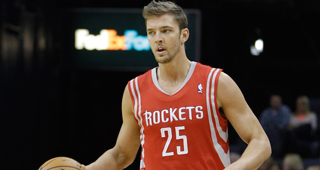Transactions in the NBA are governed by the Collective Bargaining Agreement. For the most part, the sheer volume of events often put seemingly unusual rules at the forefront. However, the situation centering on Chandler Parsons in the summer of 2014 stands out as a truly rare occurrence.
At its core, two concepts govern how free agency works for players coming off their first NBA contract:
1. If a player is selected in the first round and both team options are picked up, the team holding his rights at the end of the fourth season can extend a qualifying offer to make that player a Restricted Free Agent.
2. Any player other than those taken in the first round with less than four years experience will be a Restricted Free Agent when they are not under contract unless the team holding their rights renounces them.
The second rule previously flew more under the radar until it played a major role in the Houston Rockets signing Omer Asik (second round pick who had played two years in the NBA) and Jeremy Lin (undrafted with two years of NBA experience) to poison pill contracts last summer in order to snatch them away from their previous teams.
Thanks to the existence of these separate but parallel tracks, nearly all players coming off their first NBA contract become Restricted Free Agents. The only ones that usually fall through the cracks are first round selections who have option years declined, like Al-Farouq Aminu this offseason.
The root of what makes Parsons’ situation different is that his first contract in the NBA has the potential to cover four seasons despite being a second round pick. While the aforementioned rules make an exception to the RFA track for first round picks who have an option year declined by their team, no such exception exists for players outside of the first round. That means that there can be a circumstance where a holding franchise possesses the ability to match a contract even if they are the reason the player becomes a free agent.
In the case of Parsons, he is under contract for a mere $926,500 for that fourth year of 2014-15. However, Daryl Morey and the Rockets taking that inexpensive salary for an extra season would come at a steep price: since neither of the two above rules would apply to Parsons, he would be an Unrestricted Free Agent free to sign with whoever he liked with no ability to match. They would have Bird rights to go over the cap for him but could be left with absolutely nothing and would be lucky to get anything in return via a sign-and-trade given the new restrictive rules.
As such, the Rockets have the choice between putting Parsons into the restricted market in the cash-flush year of 2014 or having him for another bargain basement season and allowing him to become an Unrestricted Free Agent in 2015. The situation gets even more complicated because Houston has the potential for meaningful cap space in both 2014 and 2015 depending on what they do this summer. That flexibility means that management would be wise to wait until they have an understanding of their possibilities and commitments before making a decision but would have very little time to do so and potentially contend with a group of teams that just missed out on the top players in a strong 2014 class that have both money to spend and desperation to placate fans expecting an improved team.
Another middle ground exists since both Parsons and the Rockets could agree to an extension at a few different points along the way with Morey potentially using the cheap 2014-15 salary as a part of the negotiations. This gets additionally complicated because while a traditional extension limits the amount a team can pay a player based on his previous salary, the Rockets and Parsons can torch his current deal and re-sign him should they come to an agreement so it would be an extension of sorts but function different technically. This would be similar to what the Jazz and Derek Fisher agreed to and would only work if and when the Rockets have cap space to sign him outright. Finally, the last fascinating part to consider is that having such a small salary means that whenever Parsons hits free agency he will have an incredibly small cap hold. This means that if Chandler wants to come back to the Rockets, they could spend a ton of money before signing Parsons to a new deal, thus giving themselves a stronger and deeper team moving forward.
In this unique situation, all sides have some degree of leverage and the balance of power will shift numerous times over the next few seasons. It also takes on a heightened level of significance since the Rockets look to be a rising team in the Western Conference and the team best suited to pick up a new max-level free agent in one of the next two seasons. We could see Chandler Parsons be both the first and last piece on a championship team. While the structure of the NBA contains plenty of nuance and intricacy, we rarely see a truly unusual situation like this, particularly one with such potentially significant consequences.
[AUTHOR’S NOTE: While I did all of the CBA research and analysis myself for this piece, I would be remiss to not give proper acknowledgement to David Weiner at Clutchfans for his piece on the topic.]



